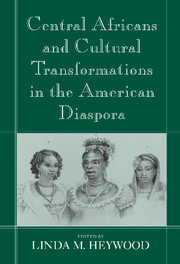Book contents
- Frontmatter
- Contents
- List of Contributors
- Foreword
- Acknowledgments
- Introduction
- PART ONE CENTRAL AFRICA: SOCIETY, CULTURE, AND THE SLAVE TRADE
- PART TWO CENTRAL AFRICANS IN BRAZIL
- 4 Central Africans in Central Brazil, 1780–1835
- 5 Who Is the King of Congo? A New Look at African and Afro-Brazilian Kings in Brazil
- 6 The Great Porpoise-Skull Strike: Central African Water Spirits and Slave Identity in Early-Nineteenth-Century Rio de Janeiro
- PART THREE CENTRAL AFRICANS IN HAITI AND SPANISH AMERICA
- PART FOUR CENTRAL AFRICANS IN NORTH AMERICA AND THE CARIBBEAN
- Index
5 - Who Is the King of Congo? A New Look at African and Afro-Brazilian Kings in Brazil
Published online by Cambridge University Press: 28 October 2009
- Frontmatter
- Contents
- List of Contributors
- Foreword
- Acknowledgments
- Introduction
- PART ONE CENTRAL AFRICA: SOCIETY, CULTURE, AND THE SLAVE TRADE
- PART TWO CENTRAL AFRICANS IN BRAZIL
- 4 Central Africans in Central Brazil, 1780–1835
- 5 Who Is the King of Congo? A New Look at African and Afro-Brazilian Kings in Brazil
- 6 The Great Porpoise-Skull Strike: Central African Water Spirits and Slave Identity in Early-Nineteenth-Century Rio de Janeiro
- PART THREE CENTRAL AFRICANS IN HAITI AND SPANISH AMERICA
- PART FOUR CENTRAL AFRICANS IN NORTH AMERICA AND THE CARIBBEAN
- Index
Summary
INTRODUCTION
Throughout the Americas, Reis Congos, or Kings of Congo, have appeared in religious festivals and ritual dramas. Wherever Africans and their descendants suffered enslavement, the election of kings and queens went with them, and in many cases these elections have continued to the present day. In Brazil, Kings of Congo play an important role in festivals with names as diverse as congados, congadas, congos, cucumbis, maracatus, mozambiques, and quilombos that occur from the North to the South of the country. Early folklorists often called the kings of these festivals “kings of smoke” or “fictive kings” and claimed they had no actual power. Their pervasiveness, however, and local importance belies that assumption. Kings of Congo and the rituals in which they participate continue to work for the populations that they represent. The symbolic work ties an Afro-Brazilian community to their African past. The Kings of Congo symbolically link Afro-Brazilians to African political structures and to their African ancestors and pretos velhos (old black spirits). The ties to a remembered past forge a shared identity for community members, defining, deepening, and strengthening their bonds with one another and to their pasts. The link that the Kings of Congo represent, however, is mythic in the sense that Afro-Brazilian communities have created a ritual memory tied to an African past, but one that is distinctly and uniquely Brazilian. The current-day Kings of Congo evolved from a tradition of black kings in Brazil that goes back at least to the seventeenth century, and that can only be understood through the examination of their cultural and historical roots.
- Type
- Chapter
- Information
- Publisher: Cambridge University PressPrint publication year: 2001
- 3
- Cited by

